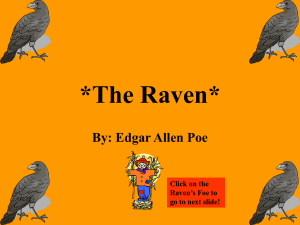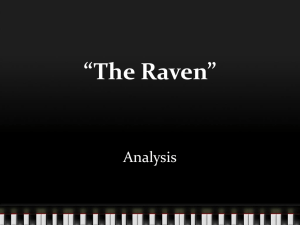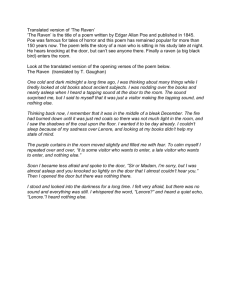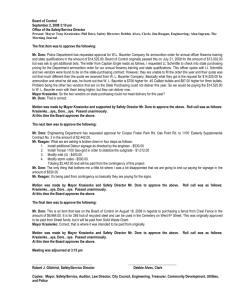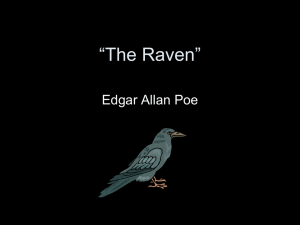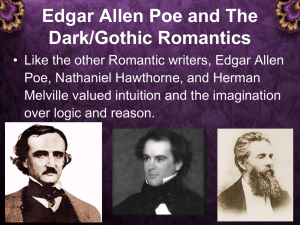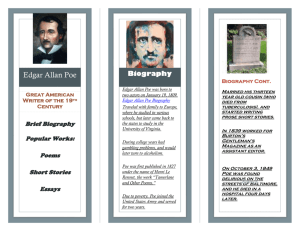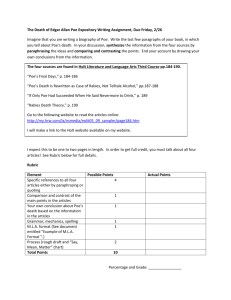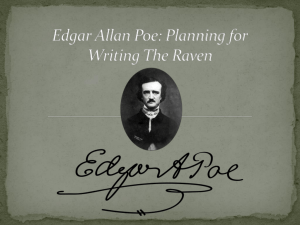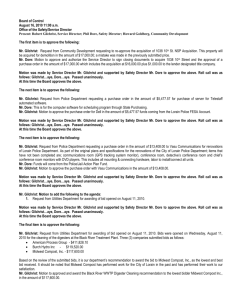Edgar Allen Poe`s The Raven, Illustrated by Gustave
advertisement
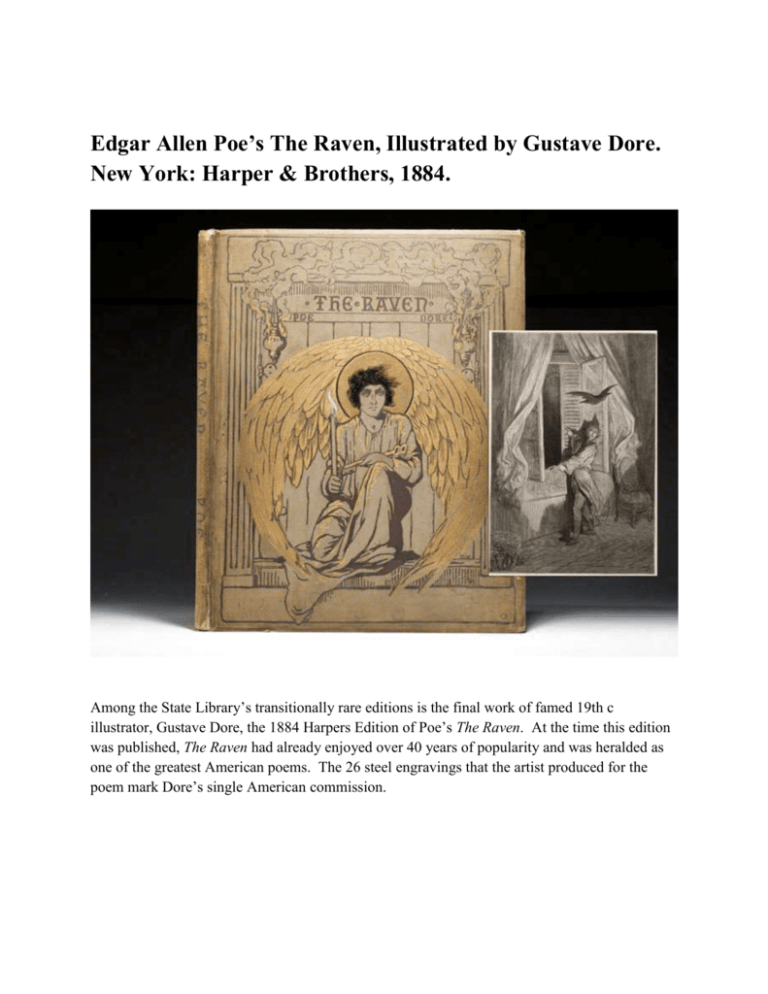
Edgar Allen Poe’s The Raven, Illustrated by Gustave Dore. New York: Harper & Brothers, 1884. Among the State Library’s transitionally rare editions is the final work of famed 19th c illustrator, Gustave Dore, the 1884 Harpers Edition of Poe’s The Raven. At the time this edition was published, The Raven had already enjoyed over 40 years of popularity and was heralded as one of the greatest American poems. The 26 steel engravings that the artist produced for the poem mark Dore’s single American commission. The careers of Dore and Poe are fraught with both popular success and unmitigated disappointment. Dore enjoyed phenomenal monetary success as an illustrator in his lifetime; however, his true desire, to be acknowledged as a fine artist, was never realized. The critics of his day derided his abilities as an artist even as his popularity soared. His popularity in England and America was always greater than in his native France, a fact that caused him great consternation. While still a teenager he obtained employment with one of the leading Parisian publishers, Charles Philipon. By the age of twenty Dore had already gained financial success and commercial popularity. His illustrations of literary classics were immensely popular and he produced a prodigious amount of work illustrating over two hundred books. Dore spent his entire adult life living with his childhood nurse and his mother. The relationships with these women superseded all others and, although he was engaged at least twice, he remained single throughout his life. It was soon after the death of his mother that Dore accepted the commission to produce illustrations for Poe’s The Raven. Dore was undoubtedly familiar with the poem, which was already immensely popular by this time. There is little written regarding the content of the poem and the artist’s recent loss of his mother. Poe’s poem revolves around the loss of his beloved, Lenore. It traces his descent into madness through the Raven’s repeated phrase “nevermore.” The despair felt by the main character of the poem mirrors the loss that Dore experienced over the death of his mother. Letters written to friends at the time of her death include the following descriptions: “She is no more, I am alone,” “How could I ever imagine the horrors of such a void,” and “I am always in the shadow of an awful solitude.” These statements sound as if they come directly from the forlorn lover in the poem. Dore, in contrast to Poe, enjoyed much financial success throughout his career, and was paid the 19th c equivalent of approximately $140, 000 by Harper Brothers for his illustrations for The Raven. Poe, on the other hand, was paid $9.00 for his poem. Like Dore, Poe was criticized by fellow poets, including Yeats who referred to him as “vulgar,” and Emerson who called him “the jingle man.” Later Aldous Huxley would compare Poe’s writing to “wearing a diamond ring on every finger” (Roosevelt, 441-443). Today, both the poem and the illustrations remain among the most popular pieces by both author and artist. The large folio edition, in addition to many other of the classics illustrated by Dore, such as Don Quixote and Dante Alighieri’s Inferno, can be seen at the State Library. The Rare Collections Library is open to students and researchers by appointment, Monday-Friday, between the hours of 9:00 am and 12:00 noon, and 1:00 pm-4:00 pm. To make an appointment, contact Dr. Iren Snavely by telephone at 717.783.5982, or by email at: irsnavely@pa.gov. The Rare Books reading room is also open periodically for tours to the general public and to Pennsylvania Commonwealth employees Christina Stanfield Rare Collections Library Intern Bibliography Fauser, Annegret, and Mark Everist. Music, Theater, And Cultural Transfer: Paris, 1830-1914. The University of Chicago Press, 2009. eBook Collection (EBSCOhost). Web. 22 July 2012. Petersen, Robert S. Comics, Manga, And Graphic Novels: A History of Graphic Narratives. Praeger, 2011. eBook Collection (EBSCOhost). Web. 22 July 2012. Ede, Laurie N. British Film Design: A History. I. B. Tauris, 2010. eBook Collection (EBSCOhost). Web. 22 July 2012. Haase, Donald. Greenwood Encyclopedia of Folktales And Fairy Tales. Greenwood Press, 2008. eBook Collection (EBSCOhost). Web. 22 July 2012. Poe, Edgar A, Gustave Doré, and Edmund C. Stedman. The Raven. New York: Harper & Brothers, 1884. Print. Roosevelt, Blanche. The Life and Reminiscences of Gustave Doré. New York: Cassell & Co, 1885. Print.

